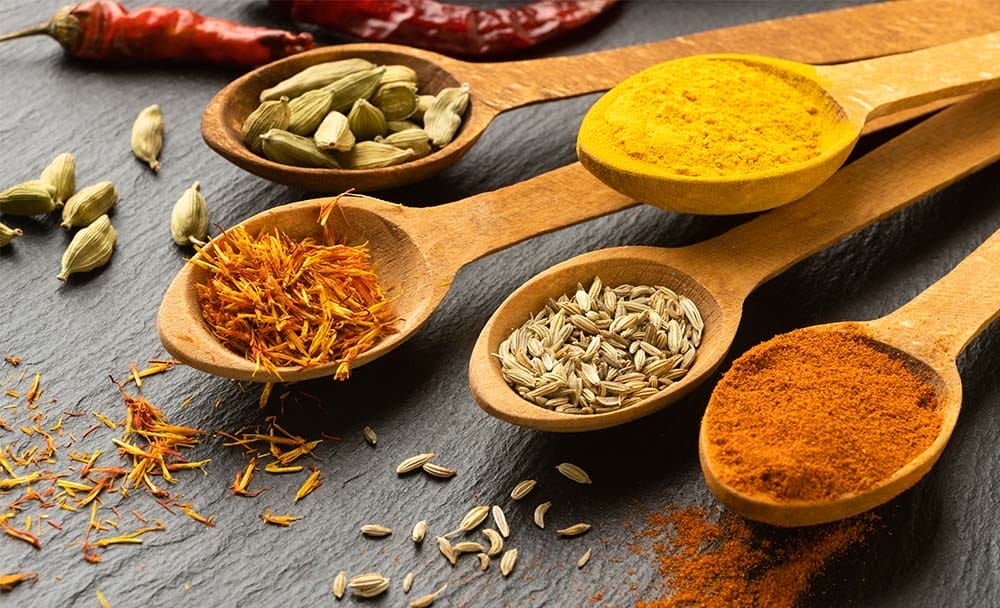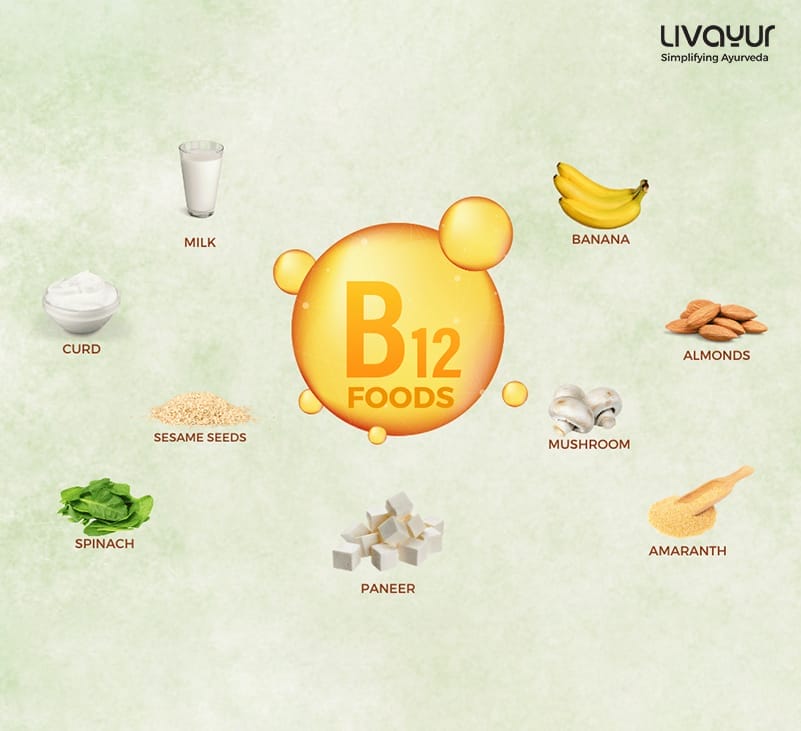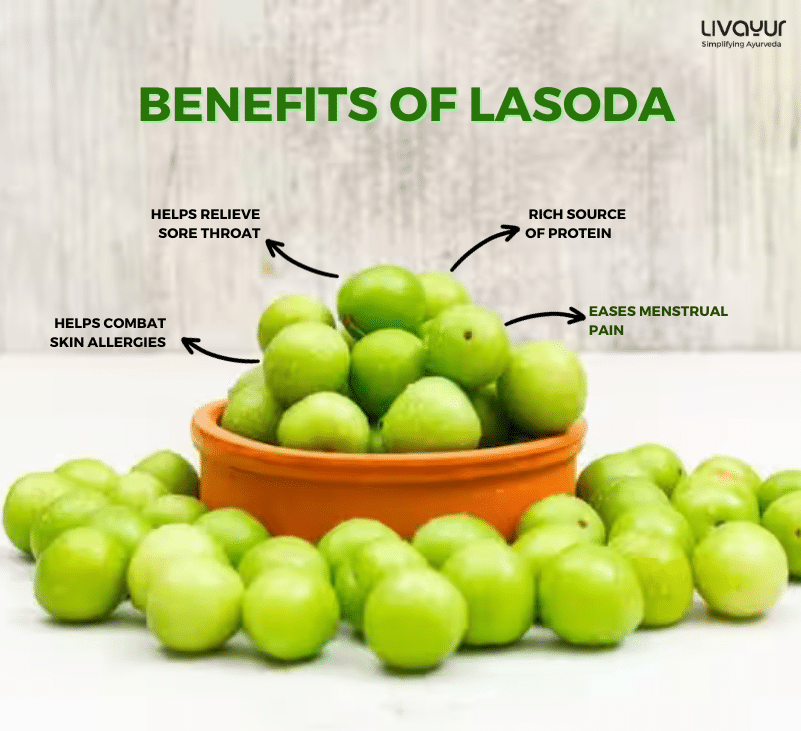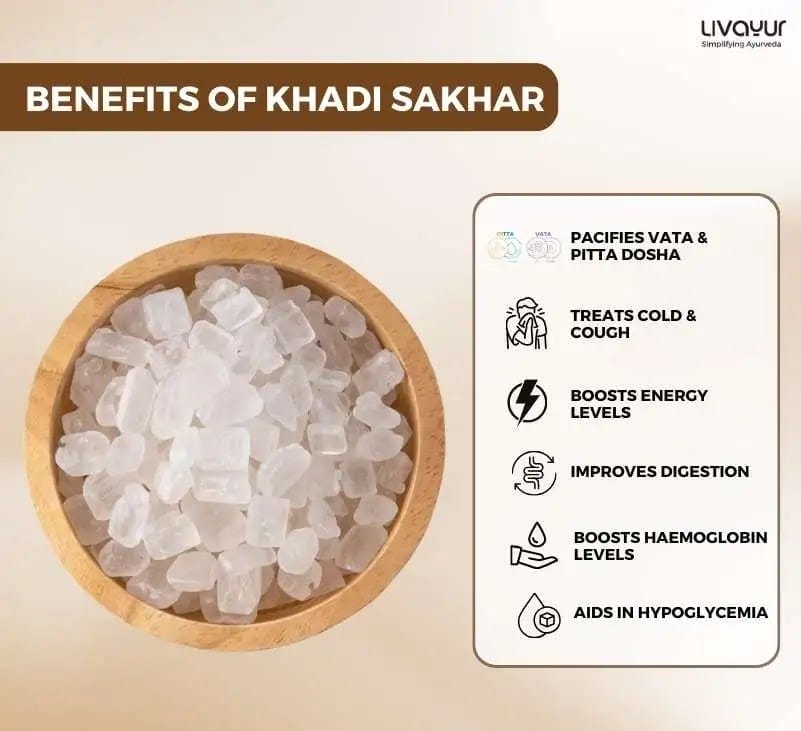“आरोग्यं परमं भाग्यं स्वास्थ्यं सर्वार्थसाधनम्॥”
Health is the biggest wealth in one’s life. It is the only thing with which all the other things can be achieved in life
India’s history is flavored with tales of spice trade and exploration, a testament to the richness of our culinary heritage. As Indians, we’re privileged with a deep understanding of Ayurveda and a refined palate, enabling us to harness the full potential of our indigenous herbs and spices. Yet, amidst the allure of Western-influenced cuisines, we’ve veered away from our roots, neglecting the myriad benefits these spices offer. It’s time to rekindle our connection with tradition and rediscover the wellness treasures nestled within our spice racks. Join us in exploring the top 12 herbs and spices renowned for their ability to enhance both health and vitality.
Types of Spices
- Dried fruits or seeds, such as fennel, mustard, and black pepper.
- Barks such as cinnamon and cassia
- Dried buds such as cloves
- Stamens such as saffron
- Roots and rhizomes such as turmeric, ginger
- Resins such as asafetida
12 Best Herbs and Spices to Boost Overall Health
1. Asafoetida – Ferula foetida
It is the resinous substance obtained by incisions on the living roots of the plant.
How to use Asafoetida:
- For dental care, put the powder with a clove bud in the cavity.
- It is a very good remedy for treating intestinal worms in children. Give them a pinch of roasted asafoetida in a glass of warm water.
- In adults ‘Hingastaka churna’ should be given in a dose of 1 tsp twice a day.
Side effects of Asafoetida
Consuming asafoetida in moderation does not show any acute toxicity. However, chronic administration of asafoetida could have undesirable effects on hepatocytes (cells responsible for a variety of cellular functions) and hematological factors (like hemoglobin, red blood cells, and white blood cells)
2. Black Pepper – Piper Nigrum
It is of the constituent of Trikatu, available in green, red, and pink varieties. It is spicy, dry, and has a hot potency. Being pungent and hot, it is good for increasing digestive power and also useful for diseases of Kapha like cough, cold, influenza, and asthma.
Also useful as Rasayana for Kapha diseases. This should be given as Vardhamana Rasayana or unit increase and unit decrease method.
How to use Black Pepper
A pinch of black pepper powder with some fruits and honey is a good remedy for the common cold.
Side Effects of Black Pepper
Memory or concentration problems, sleepiness, and dizziness are typically mild to moderate adverse side effects associated with Black pepper. Black pepper oil usually has no adverse effects. There may be a burning aftertaste from black pepper powder. Large oral intakes of black pepper have been known to be fatal since they can accidentally enter the lungs, especially for children.
3. Coriander
Similar to cilantro, coriander is used as fresh or seed powder. It is a mild spice and can be used in Pitta conditions.
How to use Coriander
You can add it as a garnishing to salads, curries, or lentils. Eyewash with coriander and turmeric powder cures conjunctivitis.
Side Effects of Coriander
In general, coriander is safe if consumed in moderation. However, if you have dietary sensitivities or illnesses, there can be certain side effects of coriander like indigestion, allergic reactions, or respiratory disorders.
4. Cumin – Cuminum cyminum
These seeds have a good aroma. It is warm, slightly bitter, pungent, and has an aromatic oil.
How to use Cumin
Whole cumin seeds are typically added to heated oil or ghee when cooking in India. The spice’s rich flavor and scent are enhanced by the tadka, or tempering, procedure. On the other hand, cumin powder is added to food either towards the end, as in stir-fries, soups, salads, chaats, etc., or while the food is simmering, as in curries and gravies.
Side Effects of Cumin
In the gastrointestinal tract, jeera or cumin intake causes more gas to be released. This excessive release of gas may cause heartburn. Hence it is advisable to consume cumin in moderation or avoid it if you are prone to hypoglycemia.
5. Curry Leaves
It is commonly used in curry to increase the taste and aroma. It contains high amounts of calcium, and vitamin A and is good for the heart.
How to use Curry Leaves
You can add dried and fresh leaves to give curries, soups, fish, meat, and egg dishes flavour and scent. You can also drink fresh curry leaves juice with sugar and lime. Additionally, leaves can be used to make tonic.
Side Effects of Curry Leaves
Kari patta allergies exist in certain people. Curry Leaves should be avoided if you have asthma or are allergic to plant pollen. Long-term application of curry leaves to the hair may result in damage. Although edible, the little pods of curry leaves should be avoided.
6. Fennel – (Foeniculum vulgare)
Used as seed or powder. Increases Agni and dispels gas in the intestine.
How to use Fennel:
You can also boil fennel seeds with water for 5-10 minutes, allow it to cool, and drink it in the morning, on an empty stomach.
Side Effects of Fennel:
There aren’t many reports of side effects from fennel. However, if you have dietary insensitivities, you might experience indigestion or diarrhea, however, these are rare.
7. Fenugreek (Methi) – Trigonella foenum graecum
Seeds and leafy vegetables are useful. Methi is one such seed. It has a bitter taste and hot potency. Methi seeds are rich in vitamins, minerals, calcium, and iron. Methi seeds are useful for increasing breast milk.
How to use Fenugreek:
Mix powder of Methi seeds in yogurt and apply on the head to remove dandruff. It is a good Rasayana for hair.
Research shows that it is good for reducing blood sugar in diabetes. It also reduces cholesterol. Diabetics can take 30 ml juice of fresh methi leaves in the morning or 30 ml cold infusion of seeds with honey.
Paste prepared from fenugreek and mustard oil is very effective as a topical application for localized edema and pain.
Side Effects of Fenugreek:
Since fenugreek is added to food in minimal quantities, it is mostly harmless. However, it is unclear if higher dosages pose a risk. Children are not recommended to use fenugreek supplements as they may cause diarrhea, nausea, and other symptoms related to the digestive tract. It may also cause headaches and dizziness however, this is very rare.
8. Garlic – Allium sativum
It has five tastes excluding sour and hot potency. It is Tamasik in nature. It has a strong sulfur smell due to allicin. It has Anti-bacterial, anti-rheumatic, expectorant, and disinfectant properties.
Garlic prevents heart disease, atherosclerosis, high cholesterol, high blood pressure, and cancer. For Vata, it is rejuvenating. It is useful in nervous disorders.
How to use Garlic:
Take 4 cloves of garlic, 5 seeds of Vidang (Embelica ribes) and equal quantity of milk and water, and boil till water evaporates. Filter and consume it warm.
Side Effects of Garlic:
Heartburn, disturbed stomach, and body odour are among the side effects. When raw garlic is used, these negative effects may be more apparent. Garlic allergies occur in certain people. Supplemental garlic may make bleeding more likely.
9. Ginger – Vishvabheshaja
Ginger is used as medicine across the whole world. When dry, it is called shunthi. It has a pungent and hot nature. It increases Agni and eliminates Ama (toxins). Good for cough, cold, and indigestion.
How to use Ginger:
Ginger tonic is good for women after delivery. For those with edema, it is advisable to consume ginger with dry jaggery. Ginger can also be simply added to boiling tea or water.
Side Effects of Ginger:
When consumed in moderation, ginger rarely causes negative side effects. When taken in large quantities, it might induce mild heartburn, diarrhea, and oral irritation. If you take ginger with meals or as a supplement, you may be able to prevent some of the moderate side effects of ginger, like heartburn, belching, and an upset stomach.
10. Nutmeg
It is pungent and astringent with hot potency. External application is useful in dry acne and to reduce edema of joints. It has good aphrodisiac action when given with milk and sugar or honey.
How to use Nutmeg:
For insomnia take 1⁄4 tsp powder with buffalo milk at night. For diarrhea, use 500 mg of powdered nutmeg with 5 ml of onion juice and coconut water. One can also have nutmeg powder with a cup of black-filter coffee.
For excessive salivation and halitosis, use 500 mg powder of nutmeg with honey and apply it in the mouth.
For indigestion, nausea, and vomiting, use a powder of nutmeg with lime juice or buttermilk and sugar.
Side Effects of Nutmeg:
Frequent unpleasant side effects include headaches, nausea, vomiting, dizziness, and tremors, in addition to chest pain and stomach pain. Elemicin and myristicin, two narcotic substances found in nutmeg, have psychotropic (affecting mental activity) effects.
11. Turmeric – Curcuma longa
It is bitter and pungent in taste and potency. It is useful in treating fresh wounds, as it has styptic antibacterial and healing action. When consumed, it increases digestive fire and improves poor circulation.
It is good for diabetes, chest congestion, and various skin conditions.
How to use Turmeric:
For chronic cough take ¼ tbsp of turmeric, 2 cloves of garlic after boiling, and reduce it to half. For increasing skin complexion, take one cup of warm milk daily with ½ tbs of turmeric and apply an external mixture of turmeric and sandalwood powder in milk or coconut water.
Turmeric is bitter, astringent, hot, and pungent after digestion. It is used externally and internally to purify both blood and mind. Turmeric has many useful therapeutic qualities, including, anti-oxidant, anti-microbial, anti-inflammatory, and insect repellent effects.
For obesity, consume 2 grams of turmeric and ginger with 1 tbsp of honey in warm water daily.
It is very useful in cancer as it is rich in nitric oxide which increases the anti-cancer properties. It also restrains the growth of leukemia in the stages of initiation, promotion, and progression. It inhibits precancerous colon growth, suppresses colon cancer, oral tumors, and multiple lines of breast cancer, and inhibits skin cancer growth when applied topically.
In general, it enhances metabolism, helps the body to reduce undesirable fatty deposits, and protects against heart disease by reducing inflammatory-causing bacteria in the blood circulation. Turmeric also has antiseptic action and helps to slow bleeding when applied topically to wounds. Turmeric paste is used for bruises, bites, stings, open wounds, boils, and breast disorders.
Side Effects of Turmeric:
While most people can safely consume turmeric in tea or food, if you have a turmeric allergy, consuming the spice may result in hives, a rash, or pain in your abdomen. The majority of negative effects are linked to extremely high curcumin concentrations found in supplements (pills, capsules, and gummies).
12. Cayenne Pepper
Cayenne pepper includes an active component – capsaicin, that has been demonstrated in numerous studies to decrease appetite and promote fat burning. Because of this property it is a common element in many commercial weight-loss pills.
Researchers discovered that those who consumed chili peppers regularly had a 13% lower death rate than those who abstained from spicy foods. The reason? Spice enthusiasts were less likely to suffer from heart-related conditions including strokes and heart attacks.
How to use Cayenne Pepper:
You can add a small pinch of cayenne powder to soups and stews. For baked foods like chocolate cake and cornbread, add freshly chopped or powdered cayenne. Add a small pinch of powdered cayenne to omelets and frittatas. For a fiery twist, add a small pinch of powdered cayenne to your hot chocolate.
Side Effects of Cayenne Pepper:
Overdosing on cayenne pepper can irritate the stomach lining, which can lead to gastritis and even ulcers. It is therefore recommended that those who have ulcers restrict their intake. Cayenne pepper supplements during pregnancy may cause nausea or heartburn.
The Takeaway
All spices are good for teeth and bones as they contain calcium and phosphorus. It is also beneficial for the contraction of muscles and for neurons. Turmeric, asafoetida, and cumin contain iron and the outer covering of nutmeg is good for increasing hemoglobin. An excess amount of vitamin A acts as an antioxidant and is good for preventing cancer of the mouth, stomach, large intestine and skin.
Cumin, cardamom, coriander and coriander seeds contain lots of colin (Amino acid) which is useful for the prevention of Alzheimer’s as it enters into neurons.
Some spices contain minerals like zinc, manganese, and magnesium which are useful for stimulating digestive enzymes. Being natural they get absorbed properly in the intestine.
References:
- https://www.ncbi.nlm.nih.gov/pmc/articles/PMC5222470/
- https://www.sciencedirect.com/topics/chemistry/hematological-parameter#:~:text=The%20hematological%20parameters%2C%20hemoglobin%20(Hb,the%20toxic%20stress%20induced%20by
- https://www.sciencedirect.com/topics/pharmacology-toxicology-and-pharmaceutical-science/coriander#:~:text=Adverse%20effects&text=Occupational%20asthma%20has%20been%20attributed,botanically%20unrelated%20species%2C%20including%20coriander.
- https://www.thehealthsite.com/diseases-conditions/ways-nutmeg-or-jaiphal-helps-to-fight-insomnia-d715-313897/
- https://niscpr.res.in/includes/images/bulletin/bulletin-2023-04-05.pdf























